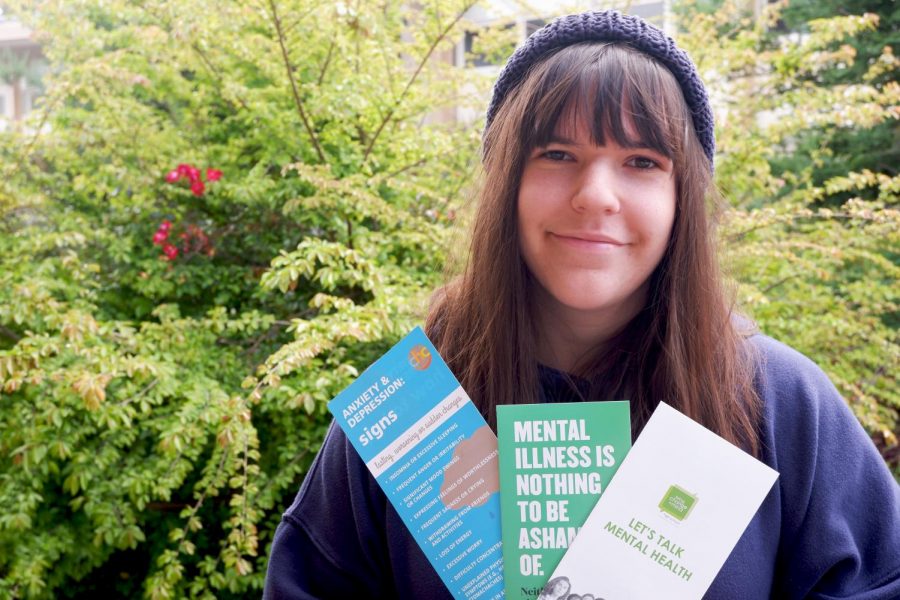Colby Peck, a Woodside junior, is a mental health advocate and an officer of Woodside’s Bring Change 2 Mind club.
Stigma, Silence, and Slang
Breaking the Mental Illness Taboo
Warning: The following story contains mentions of mental illness, self-harm, and suicide, and may be triggering for certain audiences.
One in five American teens lives with a mental illness, but many face stigma and, as a result, hide their challenges from others. This stigma can also be affected by a unlikely factor, teenage slang.
If you look at a duck swim, it looks calm as it glides across the water. But beneath the surface, its legs paddle furiously to stay afloat. This phenomenon gave rise to the term “duck syndrome,” which describes a person who is internally struggling but keeps quiet, often due to the stigma surrounding mental health.
“It’s seen as a weakness,” Woodside junior Colby Peck described. “It’s seen as something alien and foreign that’s not really supposed to be talked about.”
Many high school students hear mental-health-related slang every day. While seemingly innocuous, it can worsen stigma by making people with a mental illness feel their problems aren’t being taken seriously.
“It’s like belittling something that’s really overwhelming for them,” added Woodside High School counselor Tara Symons, who specializes in mental health.
Still, Woodside teacher Jacie Krampert explains that, despite its effects, slang isn’t always meant to be harmful.
“Usually when students are saying it, I don’t think they’re trying to minimize anything,” Krampert noted. “It’s a lack of awareness.”
To Peck, hearing mental-health-related slang hits close to home. Problems first arose when a close friend of Peck’s interpreted her interest in “emo” music as a sign of a mental illness.
“She thought it would be funny to make jokes about it, like ‘Oh, Colby’s so depressed, she’s going to go hang herself in the bathroom… Put the knife down, Colby, come on Colby, it’s fine, you’re just doing it because you want attention, huh?’” Peck recalled. “And I laughed along with it. Maybe if I showed it didn’t bother me, then they’d stop.”
But they didn’t. Even though Peck was free from her former friend group once she reached high school, the verbal abuse had taken an emotional toll. Towards the end of her freshman year, she began to self-harm.
“I’d go to the bathroom and cut my legs, like people would make jokes about in seventh grade,” Peck explained.
By the start of summer, she began considering suicide.
“I’d make a plan to write notes to all my friends, send them in the mail the day before, and then I’d drown myself in the bathtub,” Peck stated.
Until then, Peck had kept her challenges to herself. But luckily, one of her friends was worried about her and contacted her parents.
“My parents started talking to me about what was going on,” Peck said. “My mom tells me that she thinks it’s her fault because she has depression, which I didn’t know.”
Peck was eventually diagnosed with anxiety and depression and prescribed with antidepressants. Everything seemed stable until, partway through her junior year, her parents called for a meeting. Another close family member was going down a similar path.
“Apparently she was cutting her wrists,” Peck described. “And so now she’s on the same medication as me and my mom. And she hasn’t said anything to me since. We haven’t had that family talk; we never did.”
From the outside, Peck looks like a typical student. She plays lacrosse, does well in school, and enjoys spending time with her friends. That’s what makes stigma, and the slang that contributes to it, so dangerous: in the most serious cases, you can’t even see the effects. Now, when Peck hears students using mental-health-related slang offhandedly, she steps in.
“I say something,” Peck declared. “I snap. I make a comment. People just stare, like ‘Jesus, what’s wrong with them?… It’s just a joke, guys.’”
But, the so-called “jokes” echo the bullying that Peck faced in middle school, and she feels that other students’ words treat serious issues far too casually. Mental health advocates such as Krampert see open discussions as key to countering both stigma and misused slang.
“When we talk about these issues openly, then people don’t feel as alone,” Krampert reflected. “And then they feel open to say something, and then… we don’t feel like it’s this shameful issue.”
A number of groups hope to begin these discussions, including Woodside’s Bring Change 2 Mind club, which Peck and Krampert help run. Because of efforts like this, Eric Ettlin, another teacher at Woodside, is optimistic about the future.
“I think we’ve come a long way,” Ettlin commented. “In my lifetime, I think there’s been a big movement away from seeing mental health as a weakness. Mental health is just another part of our overall health and wellbeing.”
